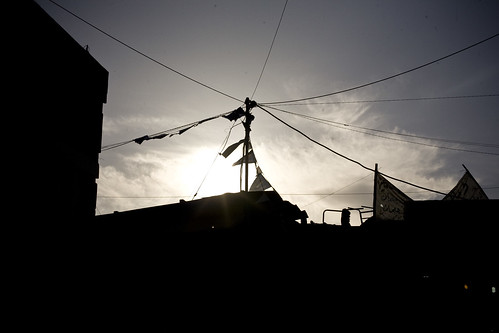I have one standard for my blog - honesty. I write what I believe (whether it's truth or not is another matter). I write in order to enact change; I write in order for my brothers and sister in Christ to agree, to say "Amen"; I write to vent or rant or ask questions. But I write with the intention of total transparency. I know I'm not always right. I know that what I say is often embarrassing or self-righteous or ignorant. I want this blog to be a testament of my brokenness. As long as it's honest.
(It's odd: I only half-realize that what I write is public. It's not until someone I don't know very well comments on a post that the regret kicks in. Should I have written that?)
But I've been doing this since I was 14, so no use stopping now. Even if this blog gets read by thousands - oh, maybe one day - I can't quit being myself. I can't quit pondering and wrestling and ranting. Am I not Ezekiel, God's mouthpiece?
--
I've been thinking about my heart a lot, because of this book I read. I finished reading Joy in the Morning by Betty Smith for possibly the fifth time. I lost count.
The story is about Annie and Carl Brown during their first year of marriage in 1927. Carl is a third year law student and Annie is his 18-year-old bride. It's a rags-to-riches story, a theme popular in its time.
I love the book because I think I'm Annie. Rather, I view myself as someone like her. I know I'm not really that much like her. I either wish I were or I try to be.
Annie's a writer. She's this quirky girl who gets way too excited about silly little things; she gets absorbed in projects; she wants to fit in; she loves reading; she loves observing people. She's a character.
What I love most about Annie - and how I relate to her the most - is her childlike heart. She seems so very young. She calls herself a dope all the time. Carl calls her his child-bride.
Annie's 18 in the book, 19 by the end, but her heart is still 12.
Her heart is a curious little girl who wants to read and write and play house.
She has conversations like this with Carl:
"Would you love me if I was a factory worker?" [asked Carl.]
"Of course. But you're not a factory worker. You are going to be a lawyer. You got to be a lawyer. I told the children their father's a lawyer."
"What children?"
"The children I'm going to have."
"We're going to have."
"I'm going to have them. You can watch." p.61
When I am confused about something or need to make a decision that my heart has a say in, I compartmentalize my Heart, my Head and sometimes my Body. I give them voices and let them speak.
I did it once for this blog.
I let my Head speak for my rationale. I let Heart speak for my, well, heart. And I let Body speak for my impulses.
But I decided a few weeks ago that my Head, my Heart and my Body are different ages. Body is obviously 20. But Head is in grad school - 24, 25 maybe.
Heart is 12.
I think my Heart's still a baby.
I remember when I first had that realization, when I was 13. When people asked me how old I was, I'd want to say 12. Sometimes I still want to answer 12.
I don't know what that says about me exactly. I hope it's nothing bad. I hope it doesn't hurt my relationships or cause me to remain naive or pathetic for the rest of my life.
But I think it'll keep me like Annie. I think it'll keep me hopeful when life is stressful. I think it'll keep me writing even if I never get published.
--
A few years ago I began this quest to find myself. I wanted to know who I am stripped of every relationship, every label or stereotype, every defining quality. I wanted to know who I am via Jesus and no one else.
Something happened, I think. I had it all figured out sometime last year. I felt cool. I felt confident. But then life happened. I started doubting God. I started doubting that he cared about me at all, that he had a plan for me. Or something. Man, I don't even know what happened.
So I'm back here again. What I started two years ago, I'm starting again. I'm trying to find myself.
Yeah, I know the basics. I know who I am as a writer. I know who I am as a student, as a woman, as a dreamer, as a friend. But I don't know who I am as a girlfriend. I don't know who I am as an adult, a professional. I don't know who I am fully. I only know in part.
I know my Head, but I don't always know my Heart. I never know what she's up to. I have to ask her, and when I do, she starts freaking out.
I figure life is like this. I wrote a few years ago how my friend Adam told me that you can never fully know who you are, and I said that I didn't believe him. I believe him now. I won't always get myself. I'm peculiar, even to myself. But I can learn. And the learning may never stop.
Ezek.






